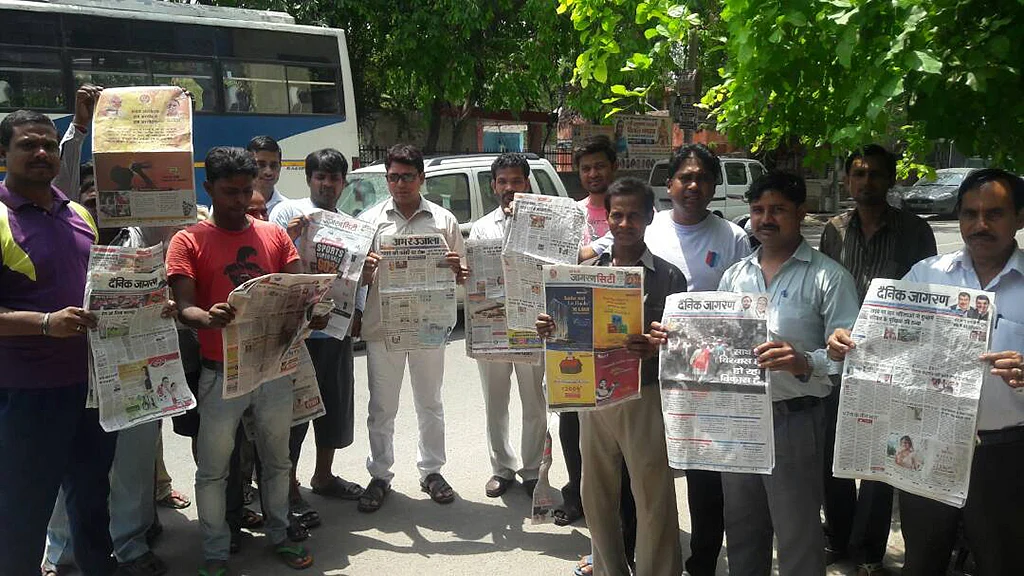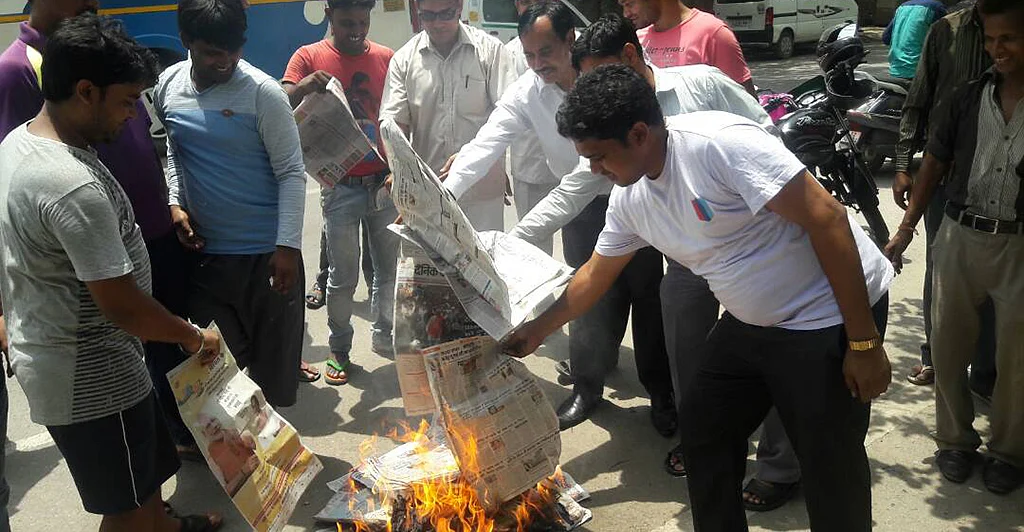Hindi Journalism Day: Why are Dalits boycotting Jagran and Ujala?
The boycott campaign against the newspapers was started by a Dalit surgeon, Dr Harvinder Singh, after Dalits were attacked for the second time in Saharanpur on May 23

Almost two centuries ago (exactly 191 years ago) on May 30, Hindi journalism was born in Kolkata. A weekly newspaper, called Udant Martand, which translates into ‘The Rising Sun’, was started by Pandit Jugal Kishore Shukla.
With 500 copies, Udant Martand marked the beginning of Hindi journalism in India. Hindi journalism has come a long way since the days of Udant Martand, having produced jewels like Harijan Sevak and Navjeevan during the freedom movement under the leadership of Mahatma Gandhi and Jawaharlal Nehru.
The journey of Hindi journalism after Independence includes many glorious chapters. Even in the worst of the times such as the Emergency, terrorism in Punjab and the rise of communalism, it never lost its connect with the people. It remained the voice of the voiceless for most of the time.
Unfortunately, that connect has now gone. “It has become the voice of upper caste people,” alleged an agitated Dalit scholar.
On the occasion of the 192th birth anniversary of Hindi journalism, copies of two leading Hindi newspapers – Dainik Jagran and Amar Ujala – are being publicly burnt by the people whose first language is Hindi. It is mainly the Hindi-speaking Dalits – in and around Meerut, who have been leading the boycott against these two Hindi publications over the last week.

The Jagran-Ujala boycott campaign was started by a Dalit surgeon, Dr Harvinder Singh, after Dalits were attacked for the second time in Saharanpur on May 23. Singh, who runs a SC/ST welfare association in Meerut, has led many protests against the newspapers until now, involving burning copies and appealing to the wider Dalit community to stop subscribing to them.
Explaining the reason behind the latest boycott, Singh told National Herald, “Our protest is against the Manuvadi media. These papers are killing the ethics of journalism. They not only sided with Thakurs when Dalits were butchered but published one-sided, fabricated news. The Dalits’ version of the incident was completely omitted from the coverage.”
Dalits, living in the cities close to Meerut, are supporting the campaign in large numbers, Singh added. According to him, the Jagran-Ujala boycott campaign crossed the boundary of western Uttar Pradesh, within five days of the boycott being launched. “Dalits living in Delhi, Haryana and Uttarakhand have boycotted the newspapers and burnt the copies too,” Singh said.
A journalist working with Hindi-daily Hindustan confirmed that “Jagran-Ujala boycott campaign” had, indeed, affected the newspapers’ sales. He noted that Jagran and Ujala had lost nearly 5,000 subscribers in Meerut alone.
“Someone from Dainik Jagran called me up saying it will not affect their circulation. But they have been dealt a serious blow,” Singh said.
When Jagran was contacted, Nivriti Pandey, who works at the Marketing Department, declined to comment. She, however, insisted that a newspaper “shouldn’t publish news against” another newspaper. “God will not forgive those who are running the dirty campaign,” she said.
The Editor of Dainik Jagran, Dinesh Dinker, was even ruder when contacted for comment by National Herald. “Jo likhna hai likho. Kiski himmat hai jo Dainik Jagran jala de (Write whatever you want. Nobody could dare to burn copies of Jagran),” was how he reacted.

The response of Amar Ujala’s Rajeev Singh was on somewhat similar lines. “Tum abhi bahut yuva ho (you are a young man),” is all he said.
National Herald has also learnt that editors from Amar Ujala, Dainik Jagran and other local dailies met at Meerut’s Krome Hotel last week, where the publications chalked out a common strategy to cover the caste violence.
“We decided not to publish news against each other,” sources present at the meeting said. “It was also decided in the meeting that the news of the boycott of the Jagran and Ujala by Dalits would not be covered,” they added.
It didn’t come as a surprise that, on the occasion of Hindi Journalism Day, the news of the boycott of the two Hindi newspapers by Dalits for almost a week wasn’t carried by any newspaper. Notably, the news was also missing in newspapers published from Delhi. In the Capital’s Trilokpuri, Dalits burnt copies of both the newspapers, too. However, a few Hindi veteran journalists are saying it as it is.
Urmilesh, a veteran scribe, wrote on Facebook, “It is hard to decide who is more dangerous for the country – anti-people politics or the so-called journalism. I cannot deny the positive aspects of both. Someone told me it is Hindi (or upper caste Hindu) Journalism Day but, bhai, forgive me. For me, the greatest day for Hindi journalism was the day when Ganesh Shankar Vidyarthi sacrificed his life for journalism.”
Follow us on: Facebook, Twitter, Google News, Instagram
Join our official telegram channel (@nationalherald) and stay updated with the latest headlines
- Dainik Jagran
- Mahatma Gandhi
- Amar Ujala
- Dalit protest
- caste clashes
- Hindi journalism day
- Udant Martand
- Harijan Sevak
- Pandit Jugal Kishore Shukla
- Dalit scholar
- Dr Harvinder Singh
